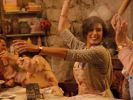Eye For Film >> Movies >> Where Do We Go Now? (2011) Film Review
Nadine Labaki's new film Where Do We Go Now? explores the impact of religious warfare or at least the threat thereof on family life in Lebanon. The story follows a group of women in a small Lebanese village, who go to extreme lengths to prevent their men fighting like everybody else in the country. The village is a pretty even split of Christians and Muslims and normally everybody gets along. But with news of conflict pouring in from the outside world, the men get restless and the women have to come up with new ways to keep them occupied.
Everything from intentional arguments and Ukranian prostitutes to a hash-laced smorgasbord in the village hall are fair game when it comes to keeping the peace. The film oscillates between the hilarious and the heartbreaking, putting the audience thoroughly through the wringer and highlighting the real, day to day impact of senseless conflict. Many of the tactics employed by the women and especially their dialogue while implementing them are highly comical, which makes the drop into despair when a young man is accidentally killed that much harder.

Young Nassim is killed in a gun fight away in town and his mother Afaf decides to hide his body to avoid the conflict sparking up in their village. She tells everybody that Nassim has mumps – a ruse her friends quickly see through – and there is a heartwrenching scene where one of Nassim's friends apologises to him through the closed door of his bedroom, while Afaf stands by, not able to cry. Another poignant scene is when director Labaki's character Amale breaks down and rages at the arguing men in her café, asking them “Do you think we're only here to mourn you?”. In the final twist of the story, all the women make a tremendous sacrifice to show their men the futility of their arguments. Only after their grand gesture is there enough peace between factions to lay Nassim to rest.
The large cast are all fantastic and the audience really gets a feel for Lebanese village life. Even without knowledge of Arabic, the mannerisms and intonation make it very clear that in its original language, the film is full of regional jokes and Lebanon-specific dialogue. Thankfully, this translates rather well. The bleak, dry landscape that the remote village is set in provides a strangely beautiful backdrop for the colourful characters in the village.
One thing that particularly struck me is how palpable it was that this film had been made by a woman. Labaki manages to get across a view of life that is not predominant in cinematic stories, without making it seem like an agenda. Many of the underlying issues and tensions are portrayed through quiet actions and little gestures rather than dialogue and the fantastic, slightly disquieting opening scene is a prime example of this. The film leaves the audience feeling like they might understand the bittersweet everyday reality of armed conflict a little better and shows that no matter what, life has to go on. It's just that sometimes, sacrifices have to be made in order for that to happen.
Reviewed on: 27 Feb 2012

















